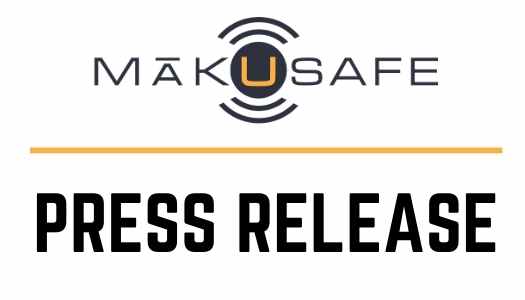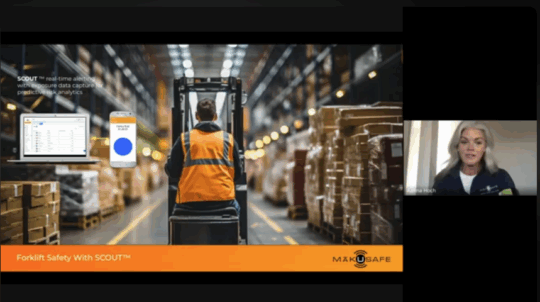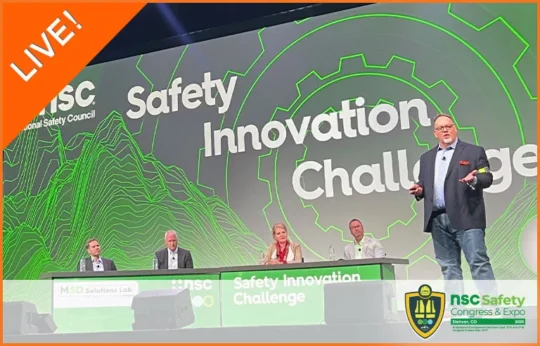With a patent in hand, Iowa-invented wearable safety device could be ‘game-changer’ for workplaces
August 17, 2018
As Gabe Glynn brought his Iowa startup to life, investors from venture capitalism hubs sought to lure his company outside the Hawkeye State.
“We were kind of discouraged with their lack of enthusiasm with an Iowa-based company,” he said. “Some of them asked what it would take to move it to Silicon Valley or Boston or New York.”
But Glynn, of Ankeny, didn’t want to move his budding company away from Iowa.
His still-in-development MākuSafe® is a wearable technology product designed for factory workers. It’s aimed at decreasing workplace injuries and death by tracking working conditions.
Glynn’s product recently received a patent, which should help it fend off competition as it goes to market in 2019.
“This patent is pretty broad-based for what we’re doing,” Glynn said. “If somebody tried to do something similar to ours, we’d have the ability to take action against them.”
So far, the company has raised more than $1.5 million — mostly from local capital.
“There is a lot of funding appetite here in Iowa, especially among the angel (investor) community,” he said. “It’s certainly not as developed or evolved as some cases, but it’s rapidly evolving and is readily available.”
‘I really see this as a game-changer’
MākuSafe’s sensors track everything from temperature to sound levels to humidity on a manufacturing floor. The wearable devices automatically note when someone trips or falls.
It’s designed to track near-misses, which experts believe can help predict future accidents but are vastly under-reported in workplaces.
Even in its infant stages, experts viewed the technology as potentially “transformative” for manufacturers, who want to avoid the lost time and additional cost of workplace injuries.
But it also stands to revolutionize the insurance industry.
Since conceiving the idea, Glynn has pivoted MākuSafe® to the insurance business, rather than proposing to sell directly to factories. Insurance companies can implement the technology as part of their workers compensation coverage.
“I really see this as a game-changer for accident prevention,” said Bryon Snethen, vice president of risk improvement at EMC Insurance. “One of the challenges with accident prevention is trying to identify where an accident might happen.”
Des Moines-based EMC Insurance is the largest investor in Glynn’s company. In announcing its partnership, EMC executives said the new technology could help the insurer stand out from its competition.
That’s, in part, because EMC writes workers compensation policies. By closely tracking safety conditions in a workplace, it can pinpoint potential problems before they happen and quickly learn from injuries when they occur.
That could potentially lower accident payout costs and premium rates.
Snethen said MākuSafe® won’t replace the valuable data the insurer keeps on clients’ claims histories. But it will complement it.
“It’s going to transform the way we look at worker safety,” Snethen said.
Are wearables-for-all the future?
Aside from helping to prevent accidents, the product will collect millions of pieces of data. Workplaces can use that data to see how they compare with similar companies.
But the devices won’t track biometric data and will keep the information of individual workers secure, Glynn said.
The plan is to eventually expand beyond factories and to target construction and agricultural facilities such as hog confinements.
MākuSafe® can also tie into a factory’s automation system.
“So if the air quality is being detected as being poor, we can cycle the air automatically,” Glynn said. “We don’t have to wait for a maintenance person to get a notification and go fire up something.”
Once factories adopt it, Glynn hopes his product will be issued alongside workers’ personal protective equipment.
“Just like safety glasses or ear plugs,” he said.
While Glynn’s product is novel, it’s reminiscent of familiar technology such as FitBits — wearable devices that track sleep, motion and calories burned. Glynn thinks eventually most workers will be equipped with some type of wearable technology.
“It could be a McDonald’s worker, it could be a janitor at a high school, it could be a professional athlete or it could be a factory worker,” he said. “Each human being produces a tremendous amount of data throughout the day.
“The biggest thing is figuring out how we turn that data into something useful. Then from there, people will just act as a conduit for that data.”
‘It’s hard to build something as a startup company’
MākuSafe® has been tested in several Iowa factories, including at Summit Products, an Altoona maker of metal and plastic RV accessories.
One of the first employees at Summit to try the product put the device around his ankle. It’s meant to be worn on a strap that wraps around the arm. But that worker informed the company that he had poison ivy on his arm.
“That was a funny nod to why testing is so important,” said Summit Products CEO Albert Marasco.
He believes the product can help build a wider culture of safety, which can help recruit and retain workers.
“I can replace machines pretty easily,” Marasco said. “But trying to create a culture where employees know deep down that this is the best gosh-darn place to work because of how we’re cared for — that’s where we want to be.”
Summit Products employs about 50 workers and experiences few serious accidents. Marasco said the company had gone more than 560 days without a serious incident. But he still found value in the data MākuSafe® collected.
“You can begin to better heat-map where incidents are more likely to occur,” he said. “We can see problem areas.”
Marasco expects that smaller manufacturers might not be interested in the product. But he said implementing it through insurers will make it more cost effective.
“The good news is, that the way the insurance companies are looking at adopting this, it’s actually free,” he said. “In fact, companies like us would probably get a reduction in prices.”
He believes so much in MākuSafe® that he’s invested in the company.
He likened the investment to putting money behind PayPal founder Peter Thiel in the late 1990s: Who wouldn’t want to go back in time and invest in that company in the years before it sold to eBay for $1.5 billion?
“It’s easy to be a doctor, it’s easy to be an attorney. It’s hard to build something as a startup company,” Marasco said. “That path is unclear. And where they’re going through is a field of crashes — the field is littered with companies that have burned out.”





